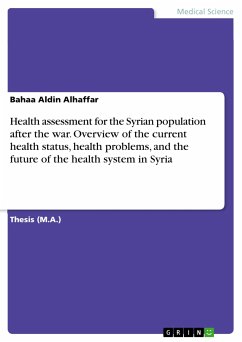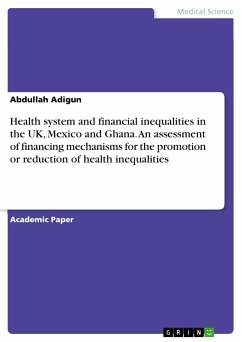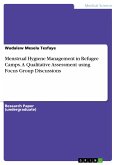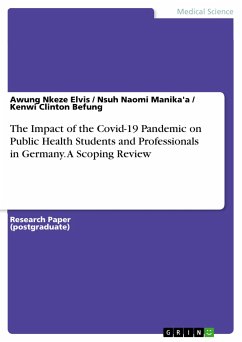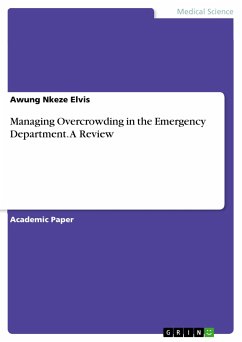Thesis (M.A.) from the year 2021 in the subject Health - Public Health, grade: 95%, University of Debrecen (public health), course: public health, language: English, abstract: 10 years of the Syrian war had a devastating effect on all aspects of the Syrian lives, millions of refugees and displaces people, enormous destruction in the infrastructure, and the worst economic crisis Syria has ever faced. This literature review aims to review all the literature written on health in Syria during the ten years of war and to summarize – within one study – all aspects of health for the Syrian population. This review focused on the direct and indirect consequences of the Syrian war over public health, reviewing, summarizing, and categorizing all the available articles and data, which makes it up-to-date research that can be of great importance for any plan to rebuild the health system in Syria. Syria's healthcare facilities and workers have been directly affected by the conflict and violence. According to the non-governmental organization "Physicians for Human Rights (PHR)", 382 attacks on medical facilities occurred between March 2011 and June 2016, killing 757 medical personnel. These attacks have destroyed the public health system, resulting in serious population health consequences such as an increase in infectious and non-communicable disease risks, serious maternal and child health challenges, conflict-related trauma, and mental health issues, as well as the exodus of Syrian healthcare workers who are seeking to flee the conflict. Due to the conflict, aid workers and medical suppliers have found it difficult to reach civilians, particularly IDPs in informal camps scattered across the country or in besieged areas such as Aleppo. Moreover, there have been many attacks on the health facilities operating in Syria from different sides, which further complicated the healthcare access for the population inside Syria. Syria's health system provided high-quality care prior to the war, however, according to the OCHA, only 64% of hospitals and 52% of primary health-care centers in the country were operational by the end of 2019, at a very low functioning percentage comparing to there function before the war, and the drugs industry have collapsed.

